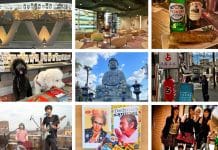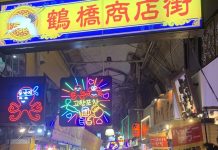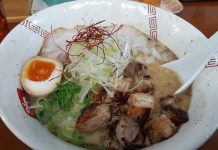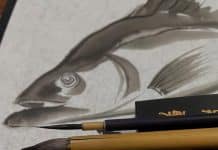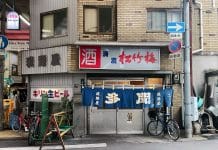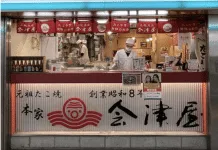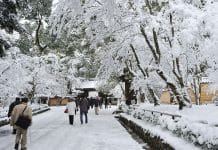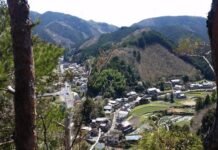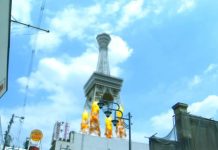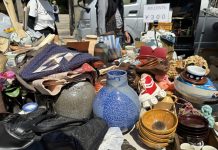In December 2023 I interviewed Osaka musician Ayu Okakita just after the release of her new album “Grow, Grow”. Written, performed, recorded and produced by Okakita herself (with co-production on a handful of tracks by Jack Ronan Osborne) “Grow, Grow” sees her pushing deeper into down-tempo autobiographical material. We talked about her childhood, early recordings, living abroad in the USA and UK and her use of music composition for self healing.
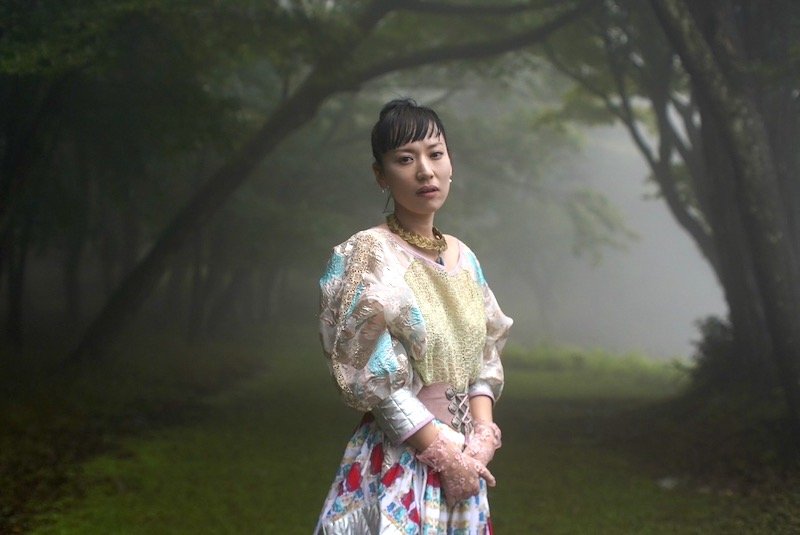
SS: Congratulations on your new album (“Grow, grow”).
AO: Oh, thank you.
SS: It sounds wonderful. It has a very warm sound, and I think it’s an extremely personal for you
and it should be because you did basically everything on it.
AO: That’s Right, yes.
SS: Before we talk about the new album, because a lot of people who are reading osaka.com might not know much about you, I’d like to ask some background questions. Firstly, I’d like to ask about your family and about music.
SS: Are you from a musical family?
AO: Not really. My dad really likes jazz and my mum’s really into classical music, but I didn’t really grow up listening to those kinds of music.
SS: And they weren’t musicians, not even amateur ones?
AO: No. I grew up listening to J-pop. I’ve always liked singing, and I liked writing songs even when I was young. When I was about eight years old, nine years old, I would make up songs. I remember making up a song about New Year’s day, and singing it to my grandmother. I always enjoyed doing that kind of thing.
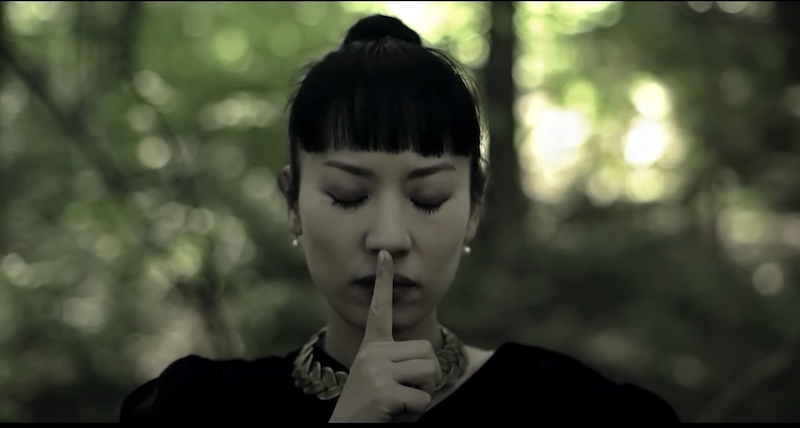
SS: When you’re that young, it’s probably a good time to start writing songs because you don’t feel embarrassment as much. You’re just having fun and making your grandma happy by singing a song to her.
AO: I wasn’t shy at all. I would sing in front of my family, telling them: “I made this song up.” And they were really happy and enthusiastic. So that was that. But when I was 13, I wanted to join a club at school. I thought maybe the brass band or something else, then I found out about a club called Folk Song Club, so I became a member. That’s when I got my first acoustic guitar.
SS: And did you teach yourself to play it?
AO: Yeah, it was just very simple chords like C and G. Very simple chords. And we were just playing covers of J-pop songs, basically.
AO: Then when I was 17 or 18, I was an exchange student for one year in the USA, in Indiana. My room was in the basement of the house. The room had no windows, but I had a TV and I used to watch MTV, so that was the first time I started listening to English and American music.
SS: What year would that have been?
AO: Around 1996
SS: Before that, you hadn’t really been listening to any foreign music?
AO: Not really. I don’t know why, but I hadn’t been in that kind of environment for some reason. And I know that in my generation, there were some people who discovered these cool bands from America or England, and they were really into it. But that didn’t happen to me, at that time.
SS: Of course there was no internet either. So for people in other countries to hear Japanese music was really difficult. Maybe Yellow Magic Orchestra and Ryuichi Sakamoto, and that was all. So I think it was difficult for people to hear music from other countries easily.
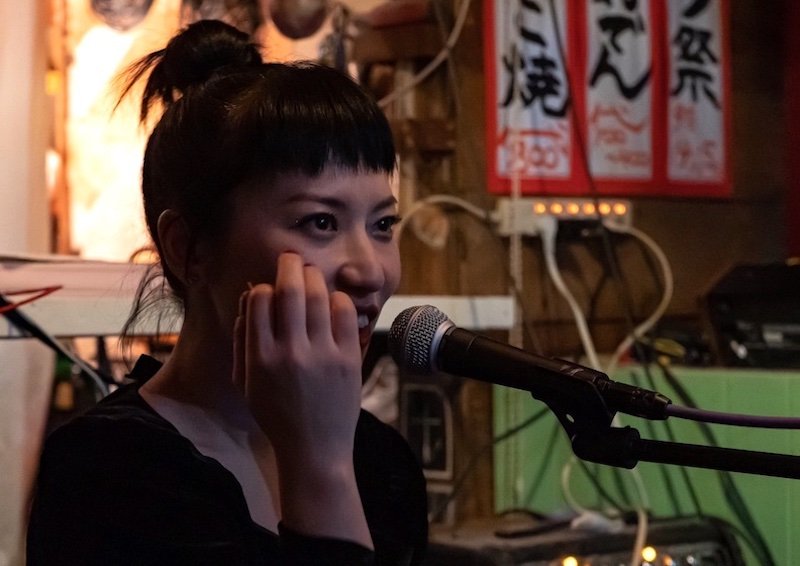
SS: Of course there was no internet either. So for people in other countries to hear Japanese music was really difficult. Maybe Yellow Magic Orchestra and Ryuichi Sakamoto, and that was all. So I think it was difficult for people to hear music from other countries easily.
AO: Also, I was really, really homesick and I felt that I was strange or weird, because I was the only Japanese student in that American high school, and I was starting to go through puberty. My hormones were changing. There were some beautiful foreign girls getting a lot of attention from the boys. But no-one was interested in me. That kind of thing really didn’t help. So I had a lot of things going on inside, and to calm myself, what I liked to do was just to write words and then put melodies to them, singing in my basement, and that made me feel so much better somehow. I noticed that, and it made me want to do it more. I decided that when I returned to Japan I’d start playing guitar again and maybe form a band.
SS: Before that happened, you didn’t watch Japanese musicians on TV and think, when I grow up, I want to be a singer?
AO: No. Ha ha ha I was enjoying the school folk song club a lot. But the feeling wasn’t that strong then. It started to feel much stronger in my basement room when that was the only thing I was doing. That’s maybe why a lot of my music is quite personal because it all started with me just writing melodies by myself in that basement.
SS: So you were able to cure your homesickness and you used music as a means to make yourself feel happier.
AO: Yes, and I didn’t have that many problems in Japan, but in the States, a lot!
SS: So you were writing songs in your basement, but you just kept them to yourself. Didn’t you ever play the songs for other people?
AO: No, no, no. I wasn’t that brave. I wasn’t shy at all in Japan, in front of my family, but in the States, I was. Maybe it was my age.
SS: Suddenly you started to get really, very self-conscious.
AO: And I remember, I looked really young compared with American girls of the same age. They all had ears pierced and wore makeup. Everybody thought I was 14 or 15 but actually I was 17 or 18. It was so embarrassing, but really just a small thing. It felt like everything was going wrong.
SS: So at the end of that year, you came back to Japan?
AO: Yes, I came back to Japan and was really enthusiastic about playing music again. I went to university, and I chose Tokyo because I thought it would be a better place for music.
SS: And at university, did you study music?
AO: No, I studied English literature. And then I started playing. I was playing songs, writing songs because I really enjoyed doing it but my next door neighbour complained that I was too loud, and I realised how difficult it was to play in that environment. Then a friend of mine suggested I play outside instead. So I started playing on the street. I started busking, and while I was doing that I met a producer and I got signed to Kitty MME, which got sold to Universal Music.
SS: How long were you signed to Kitty MME and Universal for?
AO: I released two CDs on Kitty MME and then I was signed to Universal. I think it was only two or three years.
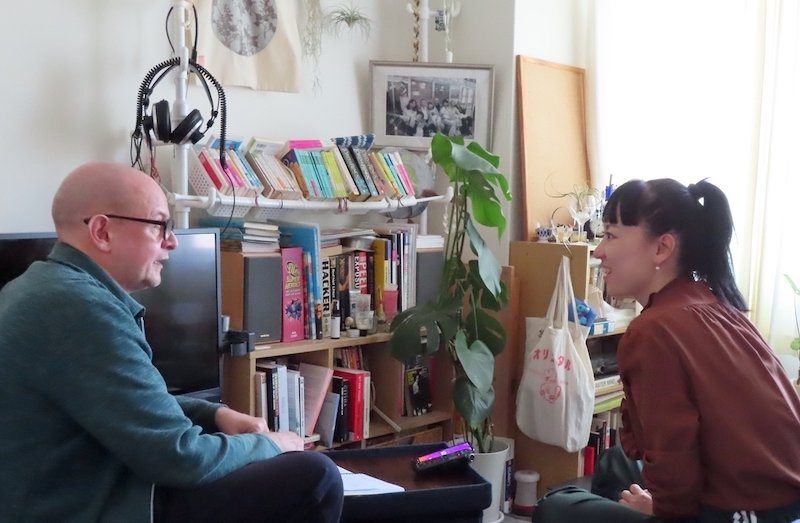
SS: How was that? As soon as you moved from the indie label, did you find that the bosses of the bigger label were pushing you to be cute?
AO: The first thing they did was to ask me to record the same songs I had recorded before! I told them I didn’t want to do that because I was finished with those songs, but they liked those songs, and they wanted to polish them and make them sound better. They hired professional musicians who were good, but my skills weren’t. When you play with good musicians, you have to be very good. When I did that, I realised that I wasn’t singing well. We were recording in a really nice studio but when I listened back to myself it didn’t sound good.
SS: And the label didn’t offer you a voice coach to help you improve your voice?
AO: No they didn’t. That was the hardest time in my life until then. I realised that I wasn’t skilled enough, and I also felt lonely. Now I know that if I feel a bit blue, I can try to be more positive. But at that time, I didn’t know how to do that. Basically I lost all my confidence .
SS: You didn’t realise that the record company only needed the musicians around you to make a solid base for you, for what they saw as a singer with something special, and actually you were the most important part of that group. Because a group of friends who make interesting music together is one way of doing it. But if you have a singer and there’s no band, then you have to employ some professional musicians who can quickly pick up what the song needs, so they’re not wasting studio time. Then it’s the job of the main artist who they signed, who they’re hoping is gonna become famous, and make them lots of money to do the part with the most character. But obviously you didn’t feel like that.
AO: I did meet interesting musicians. One of them recommended bands from England, and I got really into bands like Radiohead. When I listened to them, I loved it, it was so different to J-pop and that helped me get excited. I would write a new song and I would play it to the label and they would say “Can you write something more like the previous single?” The thing is, in J-pop you have to have a chorus and a lot of big hooks. I said: “Listen to The Beatles Yesterday. Where is the chorus?” I wanted to explore, so I decided it would be better to go abroad, so that I could make different music.
SS: In 1994 you couldn’t hear music on the Internet. That took years. So you moved to London?
AO: Yes, in 2004, I moved to London but I didn’t know anyone there. I went alone. I got a visa and became an English student. I told my teacher who seemed to be hungover every day that I wanted to play gigs, and it turned out that he was a drummer. He told me about “Open Mic” gigs. So I went to one in Camden Town, the Bullet Bar. It was December so it was getting dark early and I got lost. Someone helped me, took me to a bus stop and put me on the right bus. I will never forget the Bullet Bar. That was the first time I played in England. I did more open mic events, then started a band. That didn’t work, but through that band and MySpace, I met the people in Nedry. In 2008, I made The Cyan Dreams of Miss Ashleen, and they heard it and asked if I wanted to play with them.
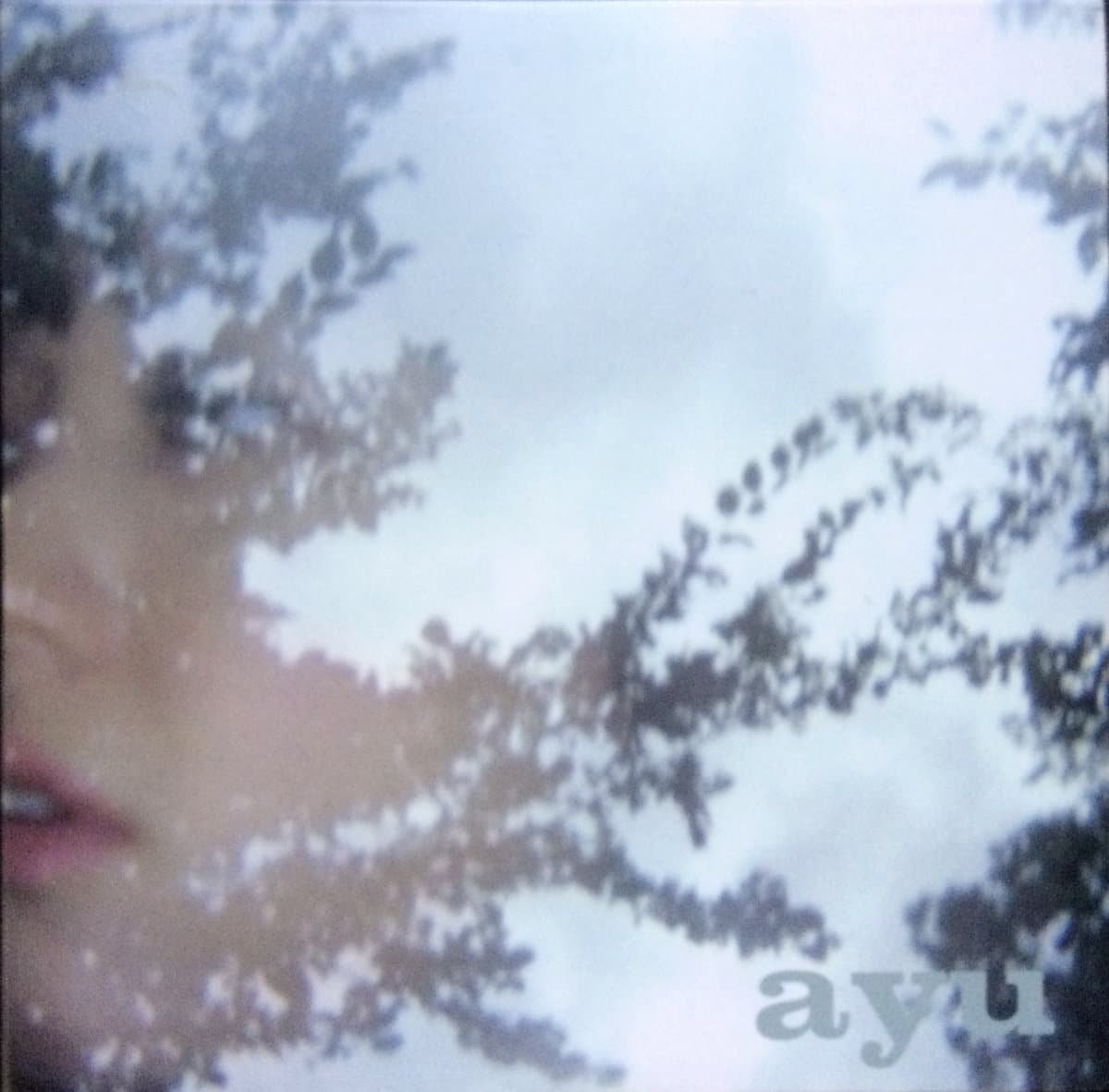
SS: So you made The Cyan Dreams of Miss Ashleen in London?
AO: Yes, I made it with a Japanese producer called Shuta who was living in London. He’s quite successful now. We recorded it at Christmas as we couldn’t afford to go back to Japan.
SS: And how was the period of time with Nedry?
AO: It was great. We toured around Europe and played at some festivals, it was fun. At the same time, I had to work as a waitress and I always had to share a flat because it was so expensive. I was in my 30’s and starting to feel burnt out.
SS: What was the label that Nedry was signed to?
AO: Monotreme Records. It’s a London based label. Run by an American woman called Kim.
SS: And what kind of genre would you say that Nedry were?
AO: Trip hop, dubstep with heavy sub bass.
SS: Which you’re obviously still a big fan of!
AO: Ha ha, yeah, I really like it.
SS: So after Nedry, what did you do?
AO: I came back to Japan. In about 2012 we did our last tour together. I especially loved the gigs in Manchester and Bristol. And it’s funny because when you know it’s the last tour, it’s more fun and you play better. It was huggy, huggy. I really enjoyed it.
Then, in 2012, I came back to Japan. And I stopped doing music completely for two years. I was busy trying to sort my life out and I started working as an English teacher which was very easy. Everything is regimented: “Come here at this time, work for these hours, and then you’re free.” That kind of routine was really good for me at that time. I needed it.
SS: Maybe when you’ve exhausted yourself from playing a lot, then the best thing is to give yourself a break.
AO: Yeah, that’s right. I didn’t know if wanting to do something would come to me again. Because when it comes to creativity, there is no right or wrong. So you’re always thinking. And sometimes it can be difficult. I really liked that the answer was there. I usually don’t like that because I want to have my own answer, but at that time it really helped me. I was very tired. But then, the desire to create returned, and if you wait for it to come back naturally and you don’t force it, I think it always feels much better. You really feel the enthusiasm. It took two years to return!
SS: And then you picked up a guitar again and maybe around that time you discovered the looper pedal.
AO: Oh, actually no, that was in London because I had a band and the guitarist was super amazing and we practised every day and I loved it. Then he told me he was leaving the band. I was so in love with his guitar that I didn’t want to find another guitarist So I bought a loop pedal. I didn’t want to have to compare a new guitarist to him. So I started playing looped guitar.
SS: So that was already in your bag of boxes and tricks and pedals?
AO: Yes, but what I couldn’t do was use music software to make beats and stuff like that.
SS: Right, let’s retrace a bit. So you came back to Japan and after a couple of years break, you started writing songs again and gradually getting back into doing a few live shows here and there.
AO: Well, yes. And I bought a synthesizer, a Korg, and was thinking that I wanted to make music again. At that time I heard in my head the Jungle drum beat that became Sayonara Dance actually. I realised I needed to get a computer and some software. So that was the beginning of Sayonara Dance.
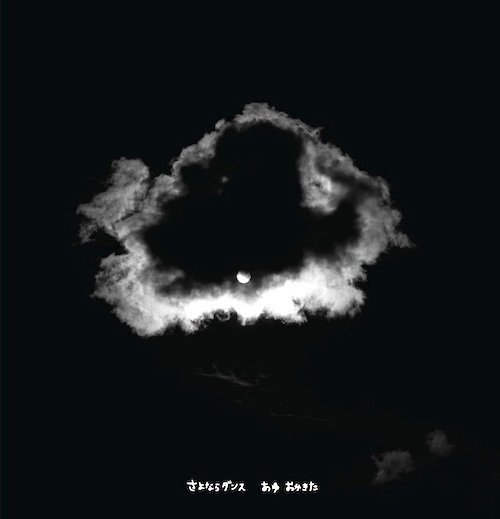
SS: That’s quite a steep learning curve if you’ve never used music software before.
AO: I knew Pro Tools, but I was always interested in Ableton Live because the Nedry guys were using it. But I had no idea how to make Jungle beats. So I got Ableton Live and then the monitor speakers and everything else. I worked really hard for those two years and all my savings went on it.
SS: But if you know that that’s what you have to do to be able to produce the music that you want to make, then there’s no choice really, is there? You either say, oh dear, it looks like it’s gonna cost a lot of money, I better not buy a computer. Or you just say, okay … BAM!
AO: I went crazy … BAB BAM BAM!!
SS: And it’s always best to buy good quality gear.
AO: You’re so right. Actually, it’s funny because as I told you, I was talking to a synth collector who actually owned a studio. He said if you want to start making music again, he said, get good monitors and good MIDI and audio interfaces. So I got good ones. It’s always better to have really well-made equipment. The good thing about my audio interface is that it’s very stable.
SS: So then you released Sayonara Dance in 2019 and you did a lot of gigs. How far around Japan did you go to play gigs? Obviously you did Kyoto, Osaka, Tokyo.
AO: Actually, I don’t know if I did Tokyo. The Red Bull thing was Tokyo, but it wasn’t actually a gig. So I only did, yeah, Kansai area. And actually I did have this random one in Kochi. I wanted to play more, but then COVID happened. I did a Star Festival and I was doing some club events as well. So I was playing quite a lot. I did like some other festivals as well then COVID happened.
SS: After you released the Sayonara Dance, that came out on Bandcamp as well, which means that people all over the world could hear it. Did you get any good reactions from either people buying the music or from any labels to say we want you to sign to our label?
AO: Nothing from labels but sometimes someone very far away bought a CD and told me “Oh, I discovered your music and I really love it.” Also because I made this in my room, not caring about other people, sometimes I felt that it was difficult to connect with the audience at some shows. I’m trying to perform and connect with the audience, and at some shows it really worked well. But at other shows I felt it was really difficult to connect.
SS: Maybe that’s just something which happens on some days. Because when we came to gigs that you did at Pikaspace (in the Shinsekai district, now closed down) the audience connection was always really good.
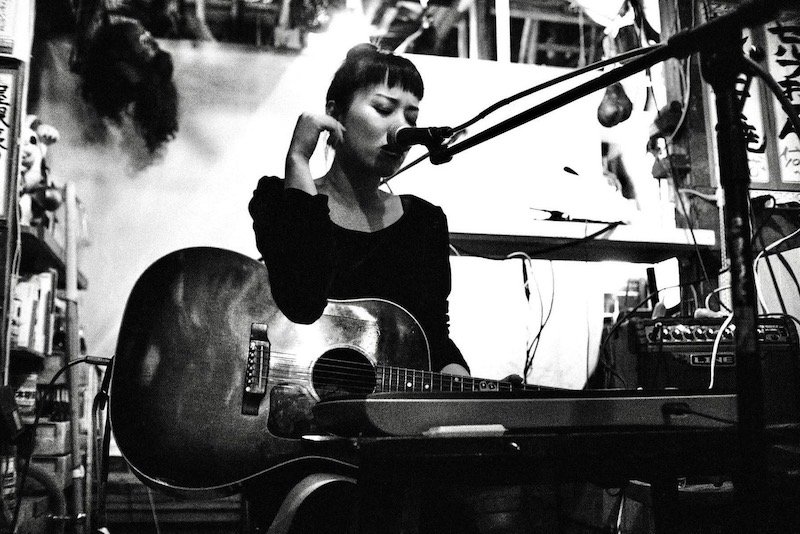
Ayu Okakita at Pikaspace Photo: Noel Slattery
AO: Yeah, but at some shows, I felt like I couldn’t make that connection. That made me feel like I want to do more gigs to get better at making that connection. Then Mexico happened. That was one of the best shows I’ve ever done, connecting with an audience.
SS: how many gigs did you do in Mexico?
AO: Two. They happened because of Nedry. Nedry performed in Mexico. We reunited just for that one show which was organized by Lorena, a Mexican woman who I became friends with. She came to Japan, just visiting because she’s an Aikido teacher. She was staying in Kyoto. and I told her that I was playing a gig there. She came to see me play and she bought a lot of my Sayonara Dance CDs. She said she would invite me to Mexico one day. And then it happened.
SS: I’m sure it was a mind blowing experience going to Mexico.
AO: Yes, it was and also the place I played was a mind blowing place. It was an old theatre. Very beautiful, previously an old theatre for plays and that kind of thing. When I played, it was a kind of an art festival. When you think of a festival, there are usually a lot of artists playing, but on one night, it was only me so that felt extra-special.
SS: If you’re playing solo and you’re the only musician playing on a particular night, that’s a huge amount of pressure.
AO: I didn’t feel pressure at all, I was so excited that I had been given this opportunity, but I was a bit worried if people were going to show up or not.
SS: Maybe your friend did a lot of promotion and made sure that everybody heard the music before the event.
AO: She did and 250 people showed up. But at the same time, I was also worried that they might get bored because they don’t know my music, and they might start talking while I was playing. That was the only worry for me. But I didn’t have time to worry about that. I had to concentrate on playing. But then I felt this audience were really into it, I could feel their warmth and attention, that they were listening. I felt the connection. So that experience made me feel very very happy.
SS: Well, you obviously did a good gig.
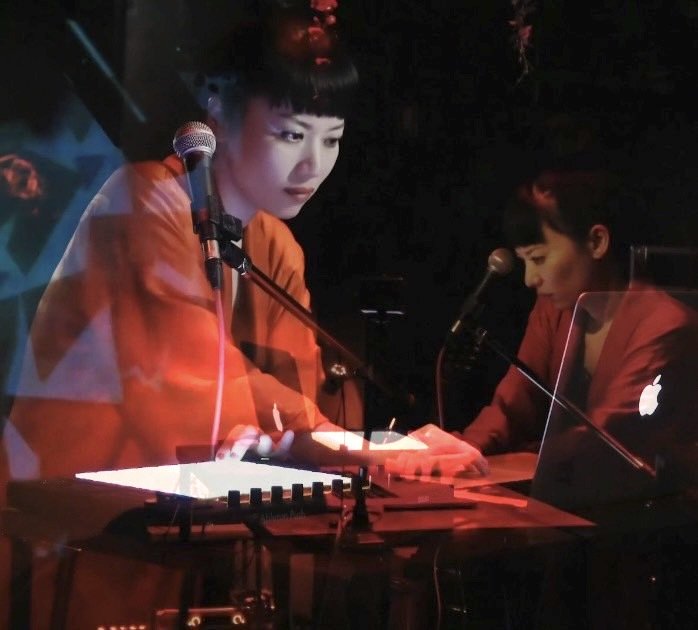
AO: I remember after the show, there was a party. We went to like a Mexican salsa bar drinking tequila. Later on I went back to my hotel room and sat on the bed and I felt the kind of happiness that I had never felt before. It was very very strong. I had been worried about the technical side because I was by myself. Worried if things were going to work okay, the electrical current stuff. It was my first time playing abroad by myself, like this. I was stopped at the airport as well. I had my suitcase searched and they didn’t speak English so I didn’t know what they were saying.
SS: That’s the kind of amazing experience that you won’t forget.
AO: I often think about that time.
SS: Nice. Now, that was a really good experience. Maybe you can get invited to go back again.
AO: I really want to, those gigs were very special for me. And Lorena is a very special person. I had another show in Mexico City and she also came to that one, and when she found out I wasn’t being paid much for that gig she said to me: “How much do you pay for your music gear? You spend a lot of money to make this music so you must always ask for a proper fee.” She’s really kind.
SS: If you don’t ask for enough money, then I don’t think promoters take you seriously.
AO: Yeah, since then, whenever I’m asked to play, I say, I need such and such amount. And that’s really because of Lorena. She really cares about me as well, as a friend.
SS: Okay, let’s, let’s start talking about Grow Grow. After releasing Sayonara Dance, while you were making Grow Grow how did you feel like you wanted to change the approach?
AO: I don’t know if I thought about it consciously, but while I was playing gigs for Sayonara Dance, I knew that I wanted to have more of that kind of song to perform live. Also I knew I wanted to put at least one song with looped guitar on it. This album is more vocal-centred.
SS: The album as a whole feels a lot warmer, because the percussion is much gentler, and not quite so spiky. I don’t think the percussion sounds you used on Sayonara Dance were harsh in any way, but it seemed like the sounds that you chose for the percussion were kind of softer sounds.
AO: Yeah, I see, I see. For example, there is a song called Mugendai, which when I was performing live, it was much harsher, and it was more rhythm-oriented. But as I continued working on it, somehow it became softer. I guess I was in that kind of mood. And I don’t know why I was in that mood, but also, like even Grow Grow, the song, I wanted to go really crazy, and in the beginning there was a massive beat going on. So it started like that, but then I started to change my mind.
SS: I guess you’re saying it’s just a natural progression of how you wanted the songs to sound while you were in the process of making the album.
AO: Yes, and also I wasn’t socialising much, because COVID happened, so maybe I wasn’t in the mood for making spiky sounds. I think that’s another reason. It wasn’t consciously done though, that’s quite interesting. It was just like I kept working on it.
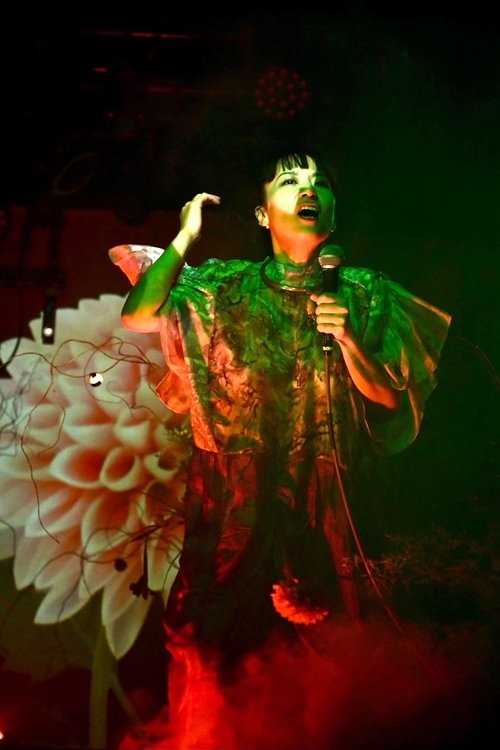
SS: Well, I mean, it’s not interesting to keep the same kind of character on consecutive albums. It’s much more interesting when there’s a change of some kind.
AO: Yeah, that’s true. And I was making more beat-based songs as well in the beginning of Grow Grow, but then they didn’t make it onto the album because they didn’t fit in. Teaching has an effect on me as well. I teach some 13, 14, 15 year old students who are shy and wear masks and caps. I can only see a tiny bit of their faces. And teaching those students has had an effect on me.
SS: What kind of an effect?
AO: I could see their growth, them being more open and confident.
SS: Is there any other reason that you chose the title Grow Grow, apart from the teaching aspect?
AO: Of course, for me as well, because I’m really happy in my 40s, and even as I’m getting older, I feel like people can still learn and grow. With creativity as well, to grow, you have to believe in yourself, and at the same time, consistency and challenge is very important. Sometimes I feel negative, and doubt myself. I have all these feelings sometimes. But then there’s some… the lyrics in Grow Grow.
SS: Yeah, the Vincent van Gogh one. It sounds like sometimes you experience imposter syndrome which a lot of musicians seem to get.
AO: Especially this time, because I was mixing so I had to listen to the songs over and over again. I love creating and I love doing this. But at the same time, sometimes I think: “What am I doing?” I often ask myself, is this any good? So these words of Van Gogh really helped me, and because I was very inspired by his passion and words, I wrote them down in my notebook and when I was singing this song, they came into me and I sang them. It’s very personal.
SS: Before I ask you for a comment on each song, I’m curious why you translated some song titles, but not others. Mugendai and Shimotsuki. You transliterated those into English, but not others. I wondered why you didn’t, for instance, write “Infinity” instead of Mugendai.
AO: It wasn’t a decision, more of a feeling. When you translate it and use the word “Infinity”, it doesn’t feel right.
SS: So it’s a particular choice about using the Japanese word rather than the English word because it sounds closer to what you intended.
AO: Yes. And also like “Shimotsuki”, if you translate, it’s November, right? It’s a way of saying November. I would have to translate it as “November” and that doesn’t sound as good to me. So I used Shimotsuki.
SS: Yeah, I’ve realised that sometimes I prefer the Japanese. The Japanese expression for something is often much closer to how I feel than the English, but sometimes English describes something much better than Japanese.
AO: It’s a really personal thing. Because I’m Japanese and I speak Japanese, so sometimes I want to use Japanese words. And I think it’s great to have that… to be able to have the ability to do both because it just enriches what you’re trying to convey.
SS: Okay. So let’s go through song by song. I’ll put Bandcamp links in so that readers can listen as they read.
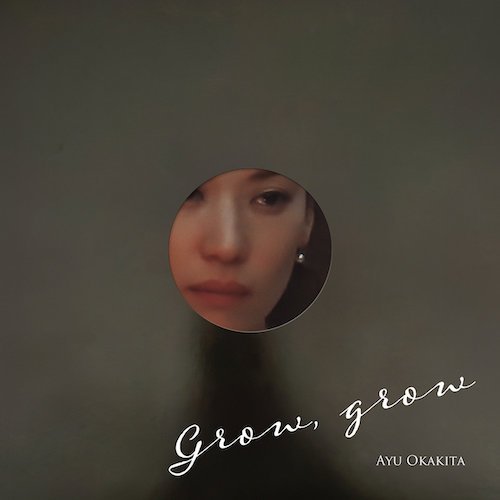
AO: The album is called Grow Grow, so in a way, Coming Out is like the seeds sprouting.
SS: So it’s a concept album? (joking)
AO: I wouldn’t say it’s 100% that, but in a way it is. I knew Coming Out had to be the first song. “You’ve been sleeping on the ground” was the image for this song. That’s why I wrote Nemuri Kara Samete.
AO: So Nemuri Kara Samete means to awake from your sleep. From a sleeping state, you come out and then you grow grow. So that’s how I wanted to go as the order. Yeah, I wanted to tell a story.
This is an important message from me to myself. To other people as well. To follow your heart and grow grow. I wanted to have an explosion part, so I was wondering how I could express that. I used a noise beat with the guitar, it was so much fun making it.
AO: The next track is Haunted. This is about the me of 20 years ago, or maybe even now because I still have that in me. And it uses only guitar. Actually, at first, I wrote this song on the piano.
SS: So that’s why you decided to end the album with the piano version?
AO: Yeah, and to perform live, because I don’t have the piano with me. I was thinking, maybe like at PikaSpace I can play it on the guitar. So this is the guitar version. And I started with a loop and I was going more experimental with this one.
AO: I wrote this song when I was completely exhausted. It was a sunny day, and I decided to go to my local park. I laid down on the grass, and felt the sun on my face. And I realised that I had been choking myself. In this song, it’s not just one melody, there’s another melody interweaving. I like doing that and I wanted to do it in this song.
AO: Actually during COVID it was very difficult sometimes. I mean, now, looking back at that time, I didn’t feel it. But Jack always supported me, telling me to keep pushing ahead. He was having problems, but he was very supportive.
AO: I really like autumn. This autumn was really nice and I would just enjoy going for a walk at night. And it was very, very beautiful with a clear sky and the moon. The air was so clear. So I was very energized and I was enjoying my night walk a lot. Even after work, when it was really late, I would just go for a walk. It was still enjoyable because the air was so crisp and refreshing. And I was writing this song at the time, so I would listen to my demo and think, “oh, what can I do with it?” while i was walking. So that’s why I called this song not “November”, but “Shimotsuki”. I prefer the Japanese way of saying it. Rather than translating it into something like November or frost moon.
SS: I know that there are many different ways in Japanese of describing seasons but that didn’t occur to me at all.
AO: I see. But you know, when you write a song, if you are writing at a particular time and situation, when you sing the song, you always come back to that time and place, don’t you? Whenever I sing that song, I always think of that time.
AO: When I was really young, about twenty three my friend, a musician friend took me to Mount Fuji. We weren’t going anywhere, we were just night driving. And because I lived in Tokyo, we ended up at Mount Fuji. We were listening to music and he turned the lights off so it was completely dark and I really enjoyed listening to the music in the darkness and it felt like infinity.
SS: So what do you remember what music you were listening to?
AO: Yeah, it was Radiohead, KID-A. That’s what I was listening to before going to England. That memory came back while I was saying this.
AO: I had an image in my mind, that I was in a wave trying to catch a wave. You’re trying to catch it, but you’re trying too hard and you can’t catch it. But I’ve learned. Sometimes trying too hard doesn’t work. Like you need to do when you are being drowned with a big wave, what you need to do is to surrender. So I had this image of a big wave. You’re trying too hard and once you’re inside the water, you’re surrendering and you’re waiting for the wave to take you to lead you. And you’re suddenly becoming one with the wave. So I had that image when I made the backing track. I tried to express that feeling in the sound of the music.
AO: In this song, I used guitar feedback to layer the sound. My favourite part is the guitar solo.
AO: And actually, that’s the end normally for the digital release but I put an extra track on the vinyl.
SS: For some reason, I was convinced that that was the last track.
AO: No, Lit Up is after it.
Lit Up (no link, vinyl only!)
AO: This was the last song that I wrote. It wasn’t intended for the album, but I put it on because it’s for my best friend who lost her husband. I was writing a song at the time, not thinking about the album, when I heard the sad news that my friend’s husband had passed away. He was a musician. Then the next day, all the words and images started coming, his blue eyes, and other stuff. He had slowly been becoming ill. And as I like to say, music is like water, keep it flowing in you. Because he was a musician and all that. So everything, I didn’t think, but it all came to me. So it felt very special that I include it so she could listen to it.
SS: But why why only included on the album and not on the digital?
AO: I don’t know. 11 songs then finish was my plan. So I carried on as planned for the digital. But by now, this was something special.
SS: On a very basic level, people who buy the vinyl and get an extra track feel like that’s unusual. Normally you have to buy the CD to get an extra bonus track, and it probably won’t be very interesting. So it’s much less usual to give people who buy the vinyl an extra track. I think it’s really nice.
AO: But I learned something, that to have a good sounding record, it should be 20 to 25 minutes per side. It doesn’t make sense to put more songs on. I’m learning.
SS: The sound of the LP is really, really good. So is it like 24 minutes a side or something like that? That’s totally fine.
AO: Is it?
SS: You know, engineers say that 20 to 23 minutes is better, but if the engineers are really good at their job, then 25 minutes is fine. I have a Miles Davis double album I bought recently (“Get Up With It” from 1974) that has over 30 minutes on each side. That really freaked me out. It sounds fine.
AO: I see. OK. Yeah.
SS: And there’s no compromise on the bass frequencies at all. It sounds great.
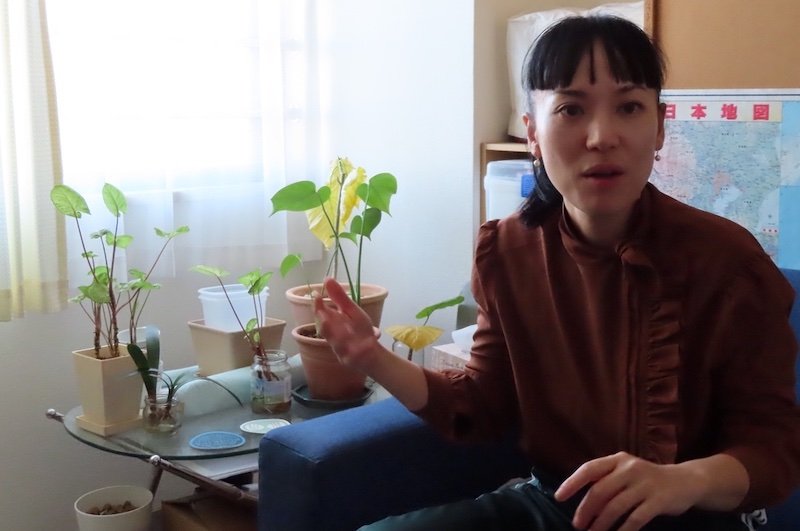
SS: Next, I want to ask something different. I’m not quite sure how to ask it. The question isn’t about listening to music or even making it, but rather, during the time that you’ve been writing songs, have you discovered your own musical theories which you feel have gradually become stronger and stronger?
AO: Well, I like to build a song, starting quietly. Start quietly and then bring it to some kind of crescendo. I like it so much that I have to try not to do it for some songs because I tend to overdo it.
SS: So a rule and a counter rule.
AO: I try to do things that way because if the songs all do the same thing, it’s not interesting at all.
SS: Anything else? Some musicians try to stop their brains interfering when they’re writing because they think the brain isn’t a useful part of the songwriting process.
AO: I love accidents and mistakes. When I make a mistake and I say “oops”, often it’s good. I pressed the wrong button or whatever and actually it’s good. I’m trying out some ideas and then … “oh!”. I always like that and sometimes it’s the best. It’s the opposite of your brain trying to control everything too tightly because it’s impossible to get the accident if you’re playing perfectly but if you make a mistake, you either decide it’s okay, or it’s wrong and it’s got to be erased. If I like the mistake then I leave it in.
SS: Okay, maybe the last question. No, two last questions. What parts of your body do you listen to music with?
AO: Here (pointing to ears). Well, here and here. (pointing to ears and the heart area)
SS: When you listen to good music it’s generally always pretty good but then when you hear it at exactly the right time, in the right place and you’re in a particular mood then it’s the best.
AO: Yes, it’s the best.
SS: When that happens, do you feel a physical sensation?
AO: Yes, I do.
SS: Do you get the chills? When I listen to music I get a strange feeling in my back, in my arms and also my head. The whole of my scalp is tingling.
AO: Oh really?
SS: It’s almost sexual pleasure. When I hear really music which is the right place, right time, right everything. I want to know what other people feel.
AO: For me, not so much here but it’s just like my whole body is like… rhythmating or vibrating. And I’m just like… I just want to say F**k! It’s like that. But even if I listen to the same song it doesn’t happen all the time.
SS: I have some songs that work all the time so I have to not listen to it too much. And then other songs which work on some occasions I’m not expecting it and I think… I don’t really like this song. And it takes you completely by surprise.
AO: And that’s why I would say sometimes the music you don’t get it but then…
SS: After maybe the second time, third time or fourth time, maybe the fifth time you listen to it, you’ve heard it a few times and then the perfect timing happens and you get it completely and your brain is flooded with nice feelings.
AO: Yes, and sometimes it happens like I listen to it by myself and it’s like… But then one day like someone’s playing it and then…
SS: Yeah, and it sounds like a completely different thing.
AO: Yes, yes, yes, I don’t know why, but that’s like that sometimes.
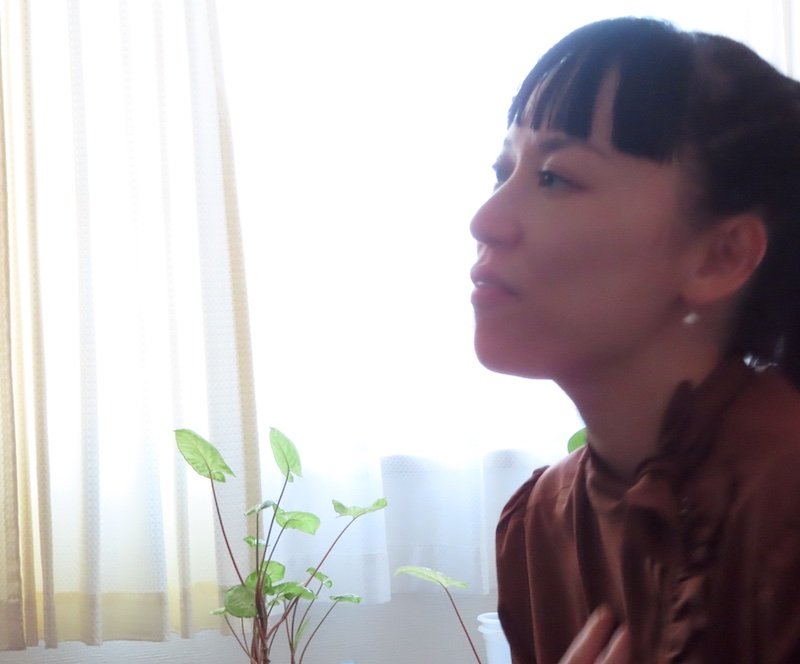
SS: Last question. Okay, what’s your next target? What do you want to achieve?
AO: Oh, I want to keep making music, but I really, really want to do a tour because I really like performing. I like playing live, and as I told you, Mexico was a big thing for me and now I’m going to try to play in Tokyo, but I want to play outside of Japan as well.
SS: So you need to get a manager or you need somebody to maybe help you find the gigs.
AO: Yes, yes, yes. And also I need to promote myself more actually. Otherwise, even if I go there and play, not very many people will come to the gigs. I really want to go to more different places to perform. Because now I can take my guitar, and I can just go. When I did the tour with Nedry in Italy, I saw what it was like. It was difficult sometimes, but at the same time it was a really nice experience. So I want to be able to do that somehow.
SS: You’ve got more than enough music to be able to tour, but it’s the boring work of trying to find the connections, and if people don’t hear your music more, then it will probably be difficult to get those gigs in foreign countries.
AO: That’s right. So that’s my next vision that I want to realize, but there are a lot of practicalities and logistics to think about.
SS: Well, good luck with all of that and thank you very much for your time, and giving us insights into your new album and the creative processes behind it.
AO: Thank you. It was fun!
Ayu Okakita plays at Rinkaiten, Kobe 17 March 2024. Check her Facebook for details.
Ayu Okakita Facebook: https://www.facebook.com/ayuokakitamusic/
Ayu Okakita Instagram: https://www.instagram.com/ayu_okakita/
Ayu Okakita official website: https://www.ayuokakita.com/
Ayu Okakita Bandcamp: https://ayuokakita.bandcamp.com/



